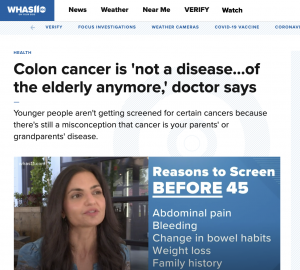Importance of Colon Screening in Younger Adults – Dr. Sohi Interviewed
Dr. Sunana Sohi of Gastroenterology Health Partners was recently featured in a WHAS-11 article and video about the increasing rates of colon cancer in younger adults.
The story featured Amanda Blackburn, a 37 year-old mother of two who was diagnosed with stage 3 colon cancer in 2017. She received a diagnosis after coming to Dr. Sohi with her symptoms of rectal bleeding and a change in bowel habits.
Blackburn had no family history of colon cancer and knew very little about the disease, like many younger adults. “It wasn’t on my radar. The ‘C’ word wasn’t a thing for me,” she said.
Dr. Sohi was able to help Blackburn receive diagnosis and treatment.
“If you have symptoms, don’t wait. There are a lot of tests that can be done, including stool tests, but the number one, the gold standard is colonoscopy. That’s because it’s not only diagnostic but preventative, where we can find and remove small polyps before they become cancer,” Dr. Sohi said.
Read the rest of the Dr. Sohi’s write-up here.
The article also discussed the upcoming Kicking Butt 5K Run/Walk, scheduled for Saturday September 25th at the Louisville Waterfront Park. This event, sponsored by the Colon Cancer Prevention Project, was started in 2003 as a way to bring together cancer survivors and advocates, spread awareness, and encourage screenings. It’s not too late to sign up for the 5K, 1 mile, or virtual event, and support this worthy cause.
If you or a loved one are experiencing symptoms of colon cancer or another GI condition, don’t hesitate to contact Dr. Sohi or one of the many experienced physicians at Gastroenterology Health Partners.
As the largest independent gastroenterology practice in the region, GHP is considered the only one of its kind providing results-orientated treatment for a full spectrum of digestive system disorders. Call to set up an appointment at one of our locations in Southern Indiana, Northeast & Central Louisville, and Lexington.



